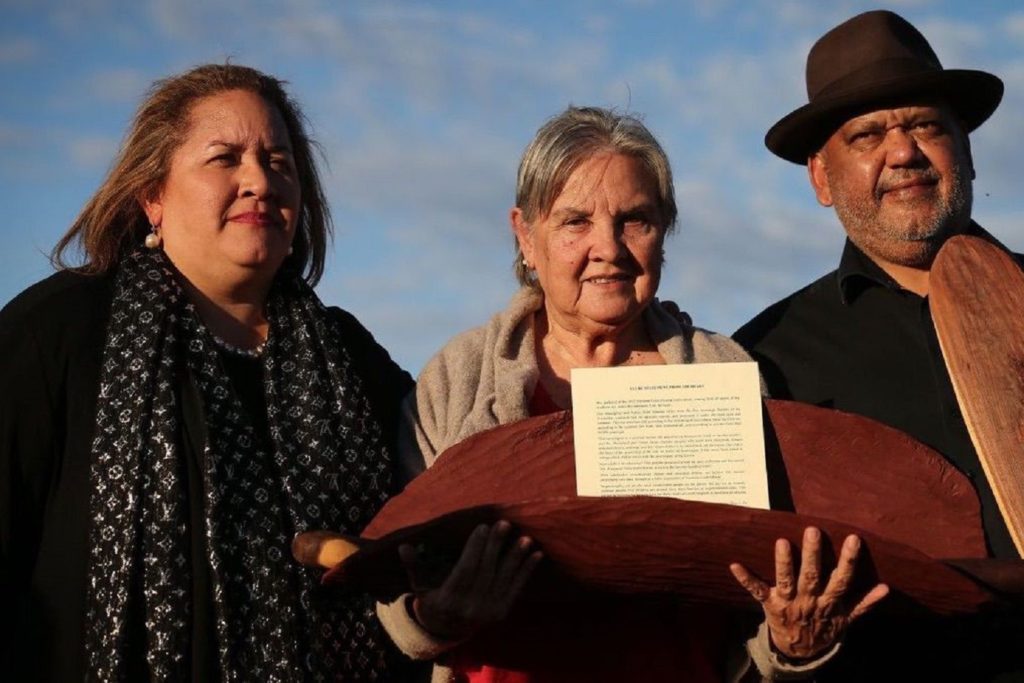In a timely recognition from the Sydney Peace Prize, which is set to award The Uluru Statement of the Heart it’s 2021-2022 honour, the Uluru Statement is also on the cusp of a referendum that could see a Voice to Parliament enshrined.
The Uluru Statement of the Heart is an invitation for all Australians to work with First Nations people for a better future by calling for the establishment of a First Nations Voice enshrined in the Constitution and a Makarrata Commission to supervise a process of agreement-making and truth-telling about Indigenous history.
Recognising this statement as nothing less than a momentous and historic peace offering to all Australians, on November 10th, the Sydney Peace Foundation will award it with Australia’s only international prize for peace with justice and human rights at its heart.
In a call for Australia to recognise its true history, the Uluru Statement of the Heart was created in 2017 to attempt to give Indigenous values and identities a voice in policies and laws. It appeals for structural reform to give First Nations greater say and authority over the decisions that impact them.
Back in 1967, a referendum granted Aboriginal and Torres Strait Islander peoples voting and citizenship rights, however there is much more that needs to be done to give First Nations communities input on the government decisions that affect their lives.
As written in the Uluru Statement: “In 1967 we were counted, in 2017 we seek to be heard.”
In his election victory speech, Prime Minister, Anthony Albanese confirmed his government’s commitment to the Uluru Statement, saying, “We will, of course, be advancing the need to have constitutional recognition of First Nations people, including a Voice to Parliament that is enshrined in that constitution.”
After generations of work, this announcement from Albanese has signaled a real commitment from the Labour government to take the question of a constitutional Voice for Indigenous peoples to a referendum.
To explain more on what a “yes” vote for Voice could mean for the Uluru Statement’s three objectives – a Voice to Parliament, Treaty, and Truth – two First Nations leaders and architects of the statement, Professor Megan Davis and Pat Anderson AO, joined in conversation with representatives from the Sydney Peace Prize during a recent webinar.
Cobble Cobble woman, Davis, is Pro Vice-Chancellor Indigenous and professor of law at UNSW. She’s a globally recognised expert on the rights of Indigenous peoples and is currently an expert member and Chair of the United Nations Human Rights Council’s Expert Mechanism of the Rights of Indigenous peoples.
Anderson is an Alyawarre woman, known nationally and internationally as a powerful advocate for the rights and health of Aboriginal and Torres Strait Islander people. She is Chair of the Lowitja Institute and was appointed an Officer of the Order of Australia in 2014 for her distinguished service to the Indigenous community as a social justice advocate.
As contributors to the creation of one of the most important documents in Australia’s history, both Davis and Anderson are among the many women leading the fight for Indigenous rights.
When asked about the role women play in the campaign’s critical advocacy efforts, Anderson said, without hesitation, “It’s women. It’s Aboriginal women and Torres Strait Islander women who are leading this campaign, and we have done it from day one.”
Looking at the campaign’s three objectives – Voice to Parliament, Treaty and Truth – Davis explains the importance of their sequence. She says ‘Voice to Parliament’ comes first because that is the opportunity on the table for constitutional recognition whereas Treaty and Truth aren’t things done on a constitutional level.
Davis also makes it clear that the referendum vote for putting Voice into the constitution needs to be simple– it’s a “yes” or “no” answer. She explains that the Voice to Parliament in the Constitution is an enabling provision that gives the Commonwealth the power to pass a law that creates a First Nations voice, and that will be done after the referendum and after a comprehensive process of consultation.
“Most Australians think it’s fair, that when you pass laws and policies about our communities, that we’re at the table,” says Davis.
“We don’t seek a green voice. We don’t seek a red voice. We don’t seek a blue voice. We seek a black voice.”
Winning the Sydney Peace Prize has been beneficial to the amplification of the Uluru Statement from the Heart and Anderson sees the prize as a timely tribute to all the people who showed up to wrestle with the complexities of the question of Voice and craft the Uluru Statement.
In response to whether there seems to be a sense of optimism for the referendum vote to be in favour of adding Voice to the Constitution, Anderson says she believes this is the best chance they’ve had in a long time but that it’s the people of Australia who will have to decide.
For Australians wondering what they can do to support the referendum moving forward, Davis suggests one of the most important things to do is open up conversations with friends, family and anyone you know. She also says there’s plenty of resources available and that Indigenous stories are a good place to start for information.
“You need to suspend your disbelief that the nation can’t change. You need to suspend your disbelief that Australia won’t understand what you’re trying to say. And we need you to imagine that the world can be a better place,” says Davis.


